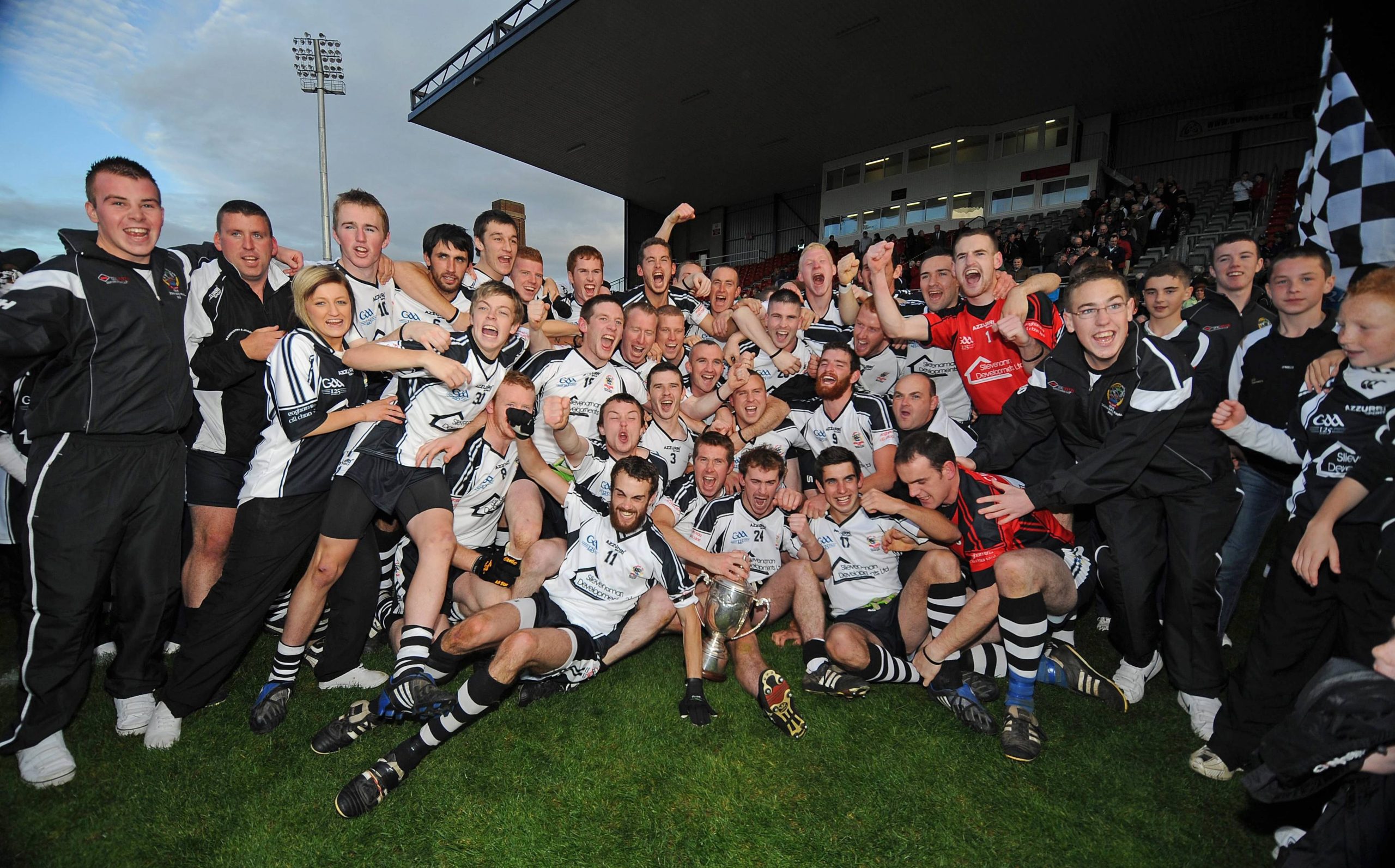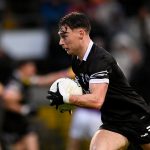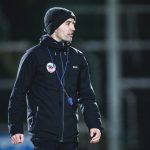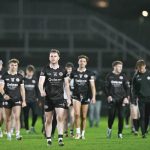Kilcoo have dominated the Down scene for 15 years and are bidding for another Ulster title on Sunday. It wasn’t always this way. In 2009, Gerard McEvoy lifted the O’Hare Cup to end a 72-year famine. He spoke with Michael McMullan…
GERARD McEvoy’s three daughters know nothing only county final Sunday and the Frank O’Hare Cup making the almost annual visit to Kilcoo.
They aren’t on their own. The minor team he now coaches are the same. For the younger generation, they are part of a Kilcoo always in the Ulster conversation.
It wasn’t always like this. There were the dark days. And plenty of them. Winning 13 Down titles in 16 years was a different planet.
“Up until 15 years ago, there probably wasn’t a whole lot to celebrate in terms of senior football,” said McEvoy.
Bogged in the lower leagues, underage rays offered a glimpse of an upward curve.
He was part of the club’s minor championship winning team of 1998, two years on from their u-16 success, Kilcoo’s first-ever county title after the odd victory in East Down competitions.
McEvoy remembers going to Newcastle to watch the seniors win a promotion play-off to club out of Division Three.
By ’98, they were promoted to the top flight alongside Liatroim who edged them to both the championship and league titles.
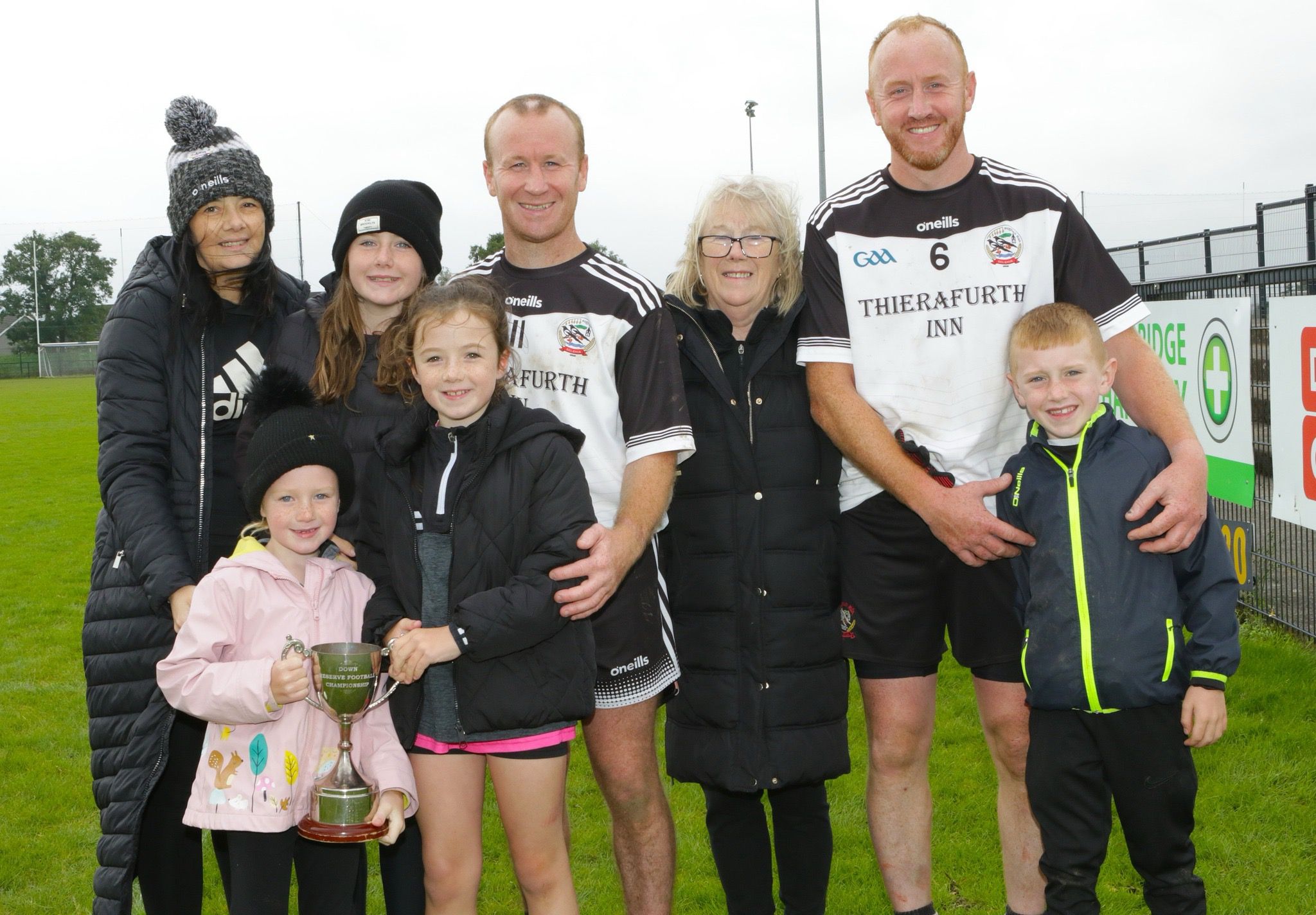
FAMILY TIME…Gerard McEvoy and his family celebrate Kilcoo Thirds winning the championship this season, also pictured is his mother, bother Niall and his son. Photo: Vncent Morgan
“If you go back to the mid to late ‘90s, we were playing Division Three football. It’s not that long ago,” he points out.
McEvoy is one of the club’s legends. He doesn’t say it, but he is. Just this year, at the age of 42, he pulled on the number 11 jersey to help Kilcoo thirds to silverware.
Before calling time on his senior career, after the Ulster final defeat to Glen in 2022, he spent the latter half of his career outside the main championship plans.
The fact he played on tells you a lot about McEvoy and the club mentality. It’s all about Kilcoo.
While he admits winning helps make the decision to stay easier, his intentions were made crystal clear.
With his 30th birthday behind him, he was going to fight for a senior championship jersey and mark all the best players in training. He didn’t want a handy paper run.
In his mind, there were three options. Leave, throw out the toys as a negative influence or pour yourself into doing whatever was needed for Kilcoo to win.
He chose the latter and is well placed to offer his two cents on the Kilcoo story.
Five years after winning a minor championship, they were senior league champions. Two milestones of equal importance.
“That probably gets overlooked now because of all the success we’ve had,” he said of that league title.
It was an early beacon of consistency but their climb to a championship was a “slow burner”. There wasn’t instant success.
Why not? The small matter of a Mayobridge team hoovering up eight championships up in a decade.
Kilcoo didn’t have an edge when it mattered. There was a champioship defeat to Division Two Longstone by a double-digit margin. McEvoy recalls a similar pasting by Mayobridge one night in Hilltown. Running out at Croke Park was a world away.
“The next year we played them, there was maybe four or five points in it, to Mayobridge,” McEvoy said of their gradual climb.
“The next year it was down to a point or two. You could see the progress being made but it was slow.”
In McEvoy’s eyes, the learnings form part of the current Kilcoo fabric.
By the same token, there’s the realisation that Mayobridge walked the walk at a time when Ballinderry and Crossmaglen were in their pomp. There was an Ulster in them too.
***
Before a ball was kicked in the 2009 championship, Kilcoo knew they where they stood on the ladder.
They took encouragement from winning the league the previous year. Beating Mayobridge in the final gave them a clearer reading of the barometer.
“You always knew if you could replicate that form, you’d be a match for anybody,” said McEvoy, also pointing to their tough route to glory.
A first-round win over Bryansford set up a quarter-final showdown with Mayobridge. This time Kilcoo weren’t to be denied as they danced through the puddles on a definitive night in Hilltown.
A quickly taken free saw Aidan Branagan hammer to the net as the course of their club’s history began to change.
The championship pedigree they take to Armagh on Sunday goes back to that day.
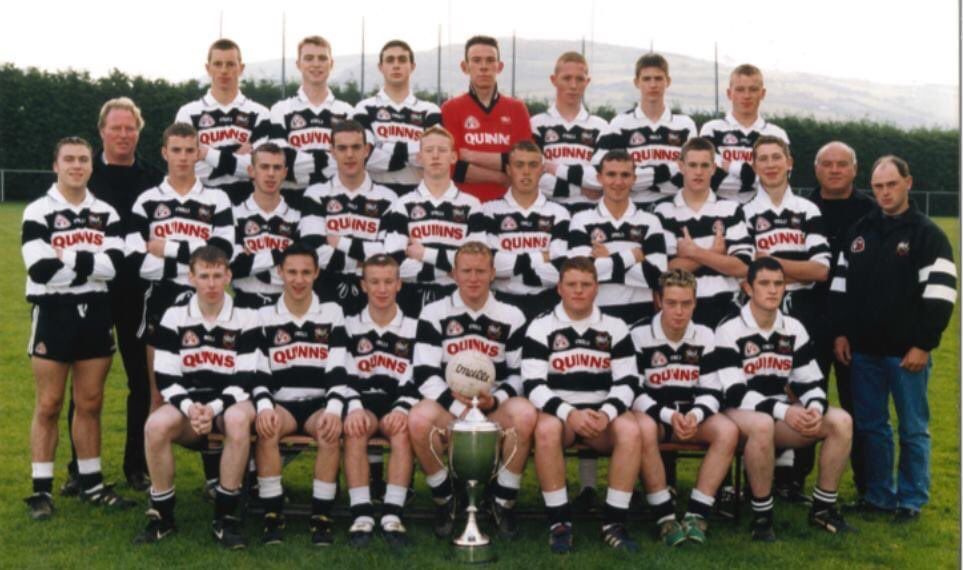
MINOR MATTERS…Kilcoo’s first minor winning team in 1998 with Gerard picture third form left in the front row
When Anthony Devlin kicked a pass out of traffic, for McEvoy’s left instep to curl between the posts, Kilcoo’s victory was in sight. The outpouring of joy at the final whistle said it all. YouTube doesn’t lie.
“It hadn’t been completely out of the blue,” McEvoy said of the result. But the was a monkey off their back.
“We probably celebrated like it was a championship final but I think every team has a building process.
“That was part of the building for us. It meant celebrating your wins whenever they happen because, at that stage, against Mayobridge, they didn’t come around too often.”
Beating the holders put a target on their back going into a semi-final with Burren. It was nip and tuck with Conor Laverty’s trickery teeing up Anthony Devlin for a late score in a close encounter.
“Burren gave us one hell of a game,” McEvoy recalls. “It was probably one of the best games we’ve ever played in. We just got over the line.”
It was every inch of the tough battle with Mayobridge to set up a first final in 51 years against Loughinisland.
There was excitement and nerves with sleep difficult to come by. Welcome to the world of preparing for something more important than sport. Kilcoo craved success.
Having played league finals there, Newry brought a degree of familiarity.
It was Kilcoo’s time. Second-half goals from Paul Devlin and Dominic McEvoy sealed victory. After 72 years, they were back on top.
“We’ve come from underage, right up through thick and thin, from bad result after bad result, but I think if you want something bad enough, you’ll stick at it,” the Magpies’ captain beamed before hoisting the cup into the air.
Looking back, it was a special moment but not one that totally dominated his thoughts. In Kilcoo, all everyone wanted to do was play football. Now, with the league titles, they dared to dream.
“For a long time in Kilcoo, we never thought we’d win a senior championship,” he said. “It was just one of those days you never forget. The whole build-up, the aftermath was mental. It was just a brilliant time.”
Winning alongside brothers, cousins and mates. That’s why the club is the jewel in the crown. Kilcoo were living that dream as champions.
Sunday night’s party turned into Monday and followed into Tuesday. Quinn’s in Newcastle was hopping when Gerard McEvoy’s phone buzzed.
It was the days before group messaging. Jim McCorry was on the other end of the line, testing the temperature of the celebrations.
He was fishing for an answer on when they’d push pause. McEvoy could picture the lads inside, partying away.
With a bus booked for Belfast on the Wednesday, a compromise was reached. They’d be back on grass by Thursday.
“It was a good thing in a way, in that training brought us back down to earth,” McEvoy said, with thoughts turning towards an Ulster opener against St Eunan’s.
“There were probably a few green faces and a few boys pulled into the ditch after a heavy night in Belfast.”
A combined 0-9 from Donal Kane and Paul Devlin helped Kilcoo back from an early deficit to see off St Eunan’s before a narrow exit against Loup. A Paul Young goal turned the tide after Kilcoo had an Ulster final in their sights.
***
Win or learn? We’ve often heard the expression. It’s something Gerard McEvoy can relate to. Kilcoo used defeat as fuel. It made them look in the mirror.
“You learn as much in losing things than you do learn a lot from winning,” he said.
Now a coach, it’s not that he wants his young teams to lose, but it’s something they’ve got to learn.
“If you look at what we came from, we’ve done a lot of losing, a lot of heavy defeats,” he said of the days before the 2009 dawn.
“We never thought we would be sitting here and have people talking about us as maybe favourites for Ulster.
“Losing has been a big part of our success and building on it and learning from it.”
Off the pitch, they’d turned full circle. A drive up the lane and you see manicured new pitches and an indoor community centre to facilitate all-round year training.
Those who put their heads together have left an imprint that will last.
McEvoy can still the days before that. A night when they were put through their paces on fields, surrounded by stone ditches.
“It was absolutely lashing,” he recalls. “There were a couple of floodlights shining over from the old changing rooms to give us a wee bit of light.”
For the guts of 20 minutes, it was running in muck and gutters. If it happened now, it would be frowned upon. Player welfare didn’t come into it but they kept on trucking.
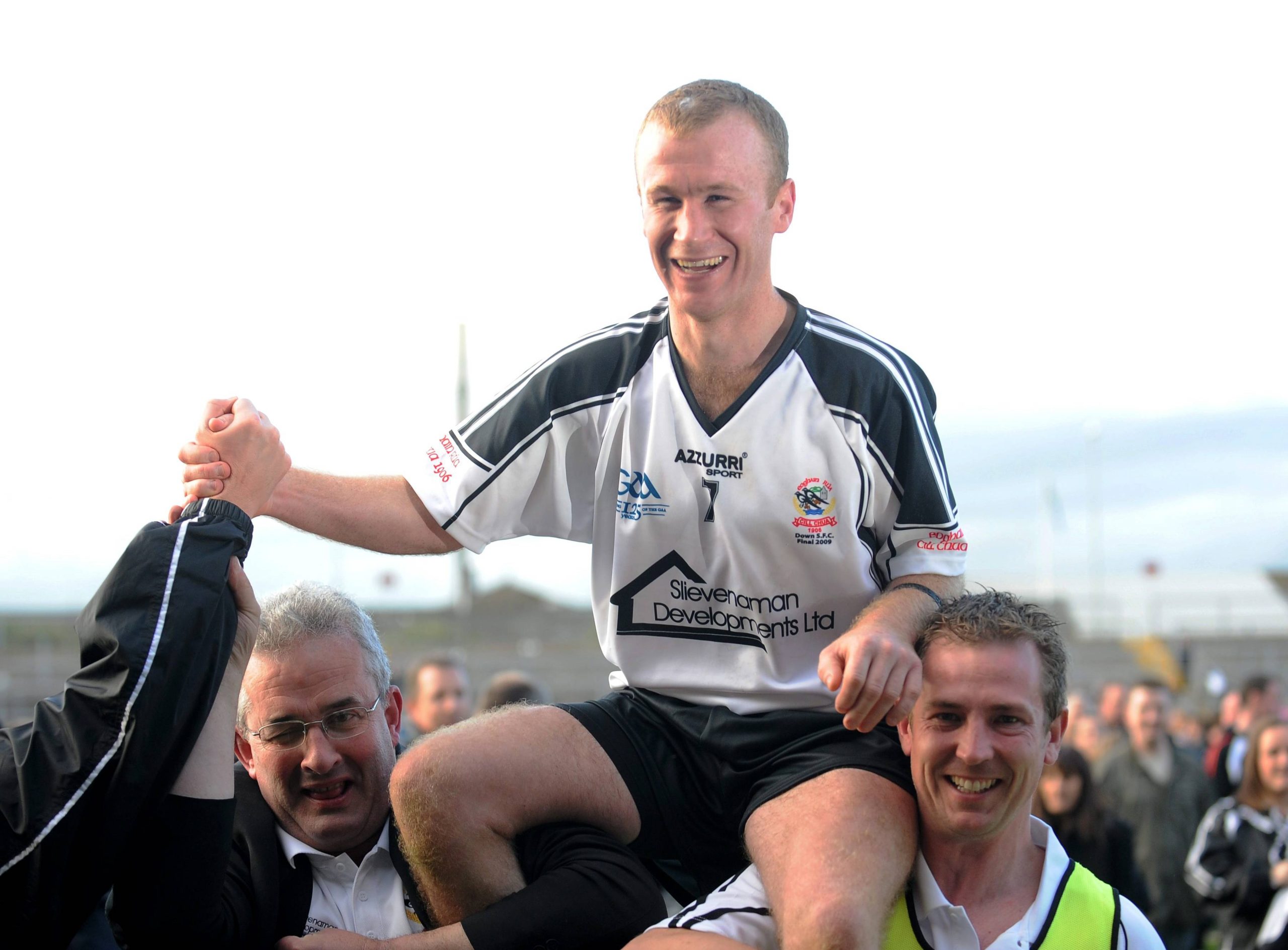
WE’VE GOT YA…Kilcoo captain Gerard McEvoy is carried shoulder high after winning the Down Championship in 2009
They’d condition the lungs and power the legs on the steps up to Lough Island Reavy above. There were sessions in Castlewellan Forest Park.
Back to McEvoy’s 2009 acceptance speech. If the want for success is there, they’d find a way.
Burren came out of Down for the next two seasons. Outside of Burren’s 2018 success and Covid cancelling the All-Ireland series, Kilcoo have always had eyes on Ulster and beyond.
“Some of the hardest games we’ve had over the last five or six years have actually been in Down,” McEvoy said.
The teams who know them so well. The near misses like the width of a goalpost in a penalty shootout with Clonduff when their Down, Ulster and All-Ireland titles hung by a thread. The tough scrapes in Down have prepared them for Ulster. McEvoy references a season they had an easy path before failing to make any impact at provincial level.
That’s where win or learn comes in. The defeat to Loup in 2009 was an indicator Ulster wasn’t the different planet they thought it might be.
“You always have this picture that the teams are so much better than what you are,” McEvoy points out.
“When you get a wee taste of what is out there, you realise that on any given day, the weather, the referee, the different small things, they can make a big difference and you still carry that through to this day.”
If Kilcoo could find a way out of Down and maintain their standards, they had as good a chance as anyone.
Gaoth Dobhair camefrom nowhere.Sleacht Néill became kings after Ballinderry in Derry. Different challengers offered hope.
“You’re looking around and you realised anybody can win in Ulster if you get all the small things right.”
After losing finals to Crossmaglen and Sleacht Néill, Kilcoo climbed to the top in Ulster.
There was an All-Ireland final defeat before coming back to land the biggest prize of all with Jerome Johnston’s last-gasp winner sinking Kilmacud Crokes.
“You were looking back to 2008 and 2009 and thinking you’d take a Down Championship,” McEvoy said, again referencing the darker days of defeat. Just one championship.
“You look over the hedge and see what’s on the other side and then you take that. Getting to the first All-Ireland final, we faced probably the best club team to play the game.
“When we saw how close we were to Corofin, it gave us that belief that if we did get back there, we could be a match for anybody.”
***
There are six teams left in the race to win the All-Ireland. For now, Kilcoo are one of them. Errigal Ciaran will want to change that.
Sunday is their sixth Ulster final. Two wins. Three defeats.
Regardless of how the ball bounces this weekend, it’s hard to imagine a conversation in 12 months’ time that doesn’t include Kilcoo.
That’s why the men of 2009 are so important. Scratch the surface on any success story and there is always a breakthrough.
There is always a grain that tips the scale.
Aidan Branagan’s goal on that wet 2009 night in Hilltown was as important a score as any the
Magpies have conjured over the years.
That’s why people in Kilcoo expect silverware. It might come and it might not but it’ll never be far from reach.
The fields are full every night, kids wanting to be the next Ryan McEvoy, the next Paul Devlin or the next Micéal Rooney.
Gerard McEvoy, who kicked many a point off his trusted left foot, was the iconic man to lift silverware and drive the standards at training when a starting jersey was rarely thrown in his direction.
When his cousin Paddy Murray asked him on board with the u-16s, he was senior captain at the time. It was a successful stint with players he’d go on to soldier alongside in later years.
Coaching was parked as work and football squeezed out any free time until he made the decision to retire from senior football.
It didn’t take long for Dominic McEvoy to get on the phone looking for a hand with the minors. The answer was a yes.
Winning minor captain Anthony Devlin, Pearse McEvoy, Marc Rogan and Conor Laverty are also on board.
So too is his uncle Barney McEvoy, who was part of the 1998 minor winning management.
“It’s probably 30 years he has been involved with the minors,” McEvoy sums up.
That’s the cycle of a club. The more things change, the more they stay the same.
Receive quality journalism wherever you are, on any device. Keep up to date from the comfort of your own home with a digital subscription.
Any time | Any place | Anywhere




